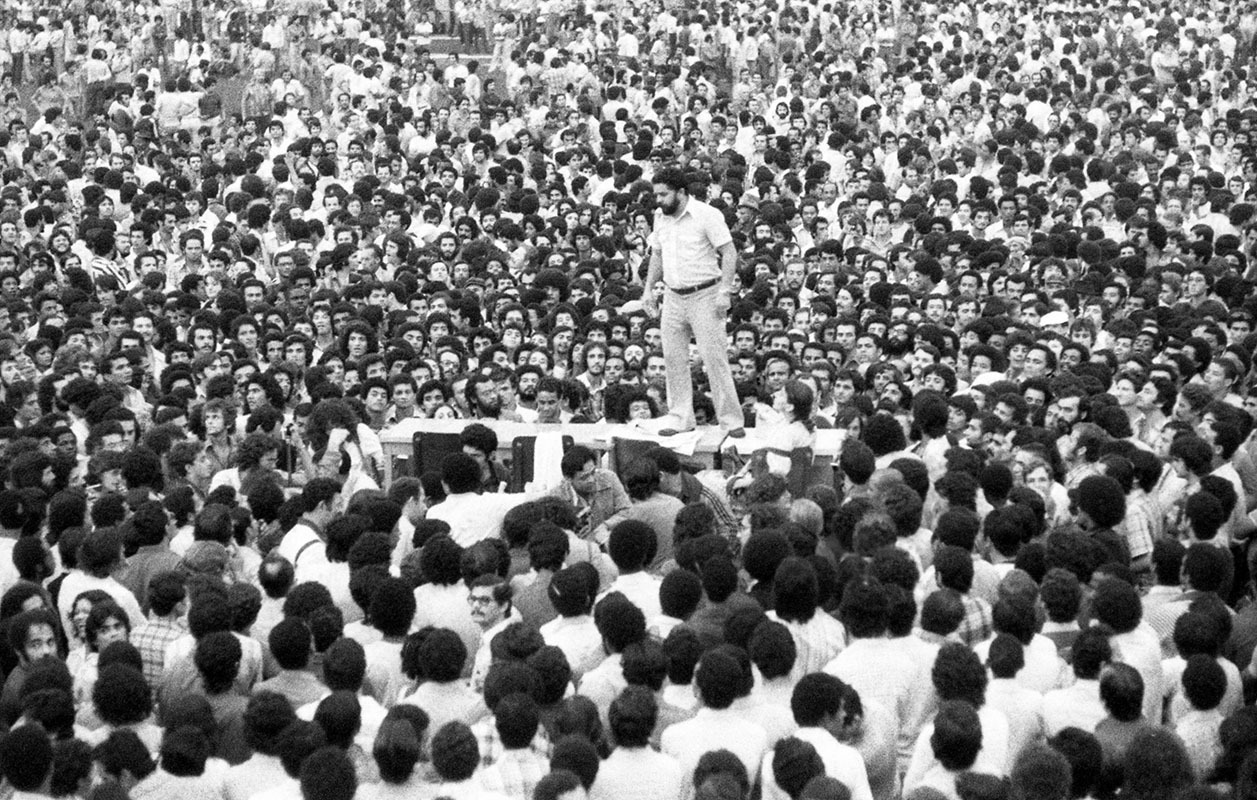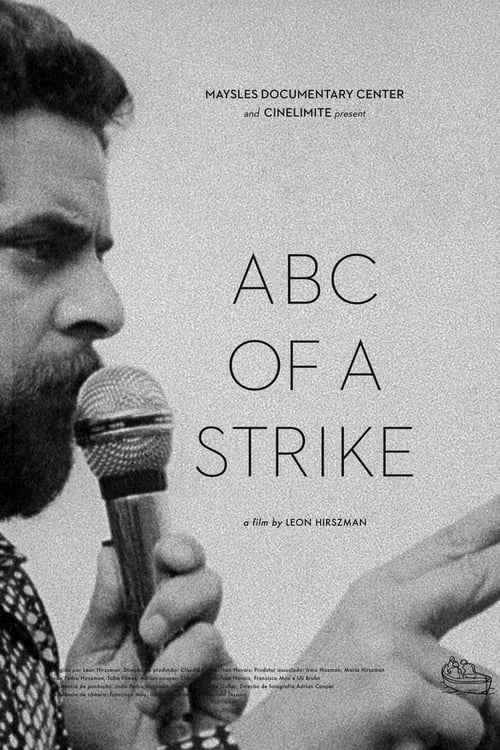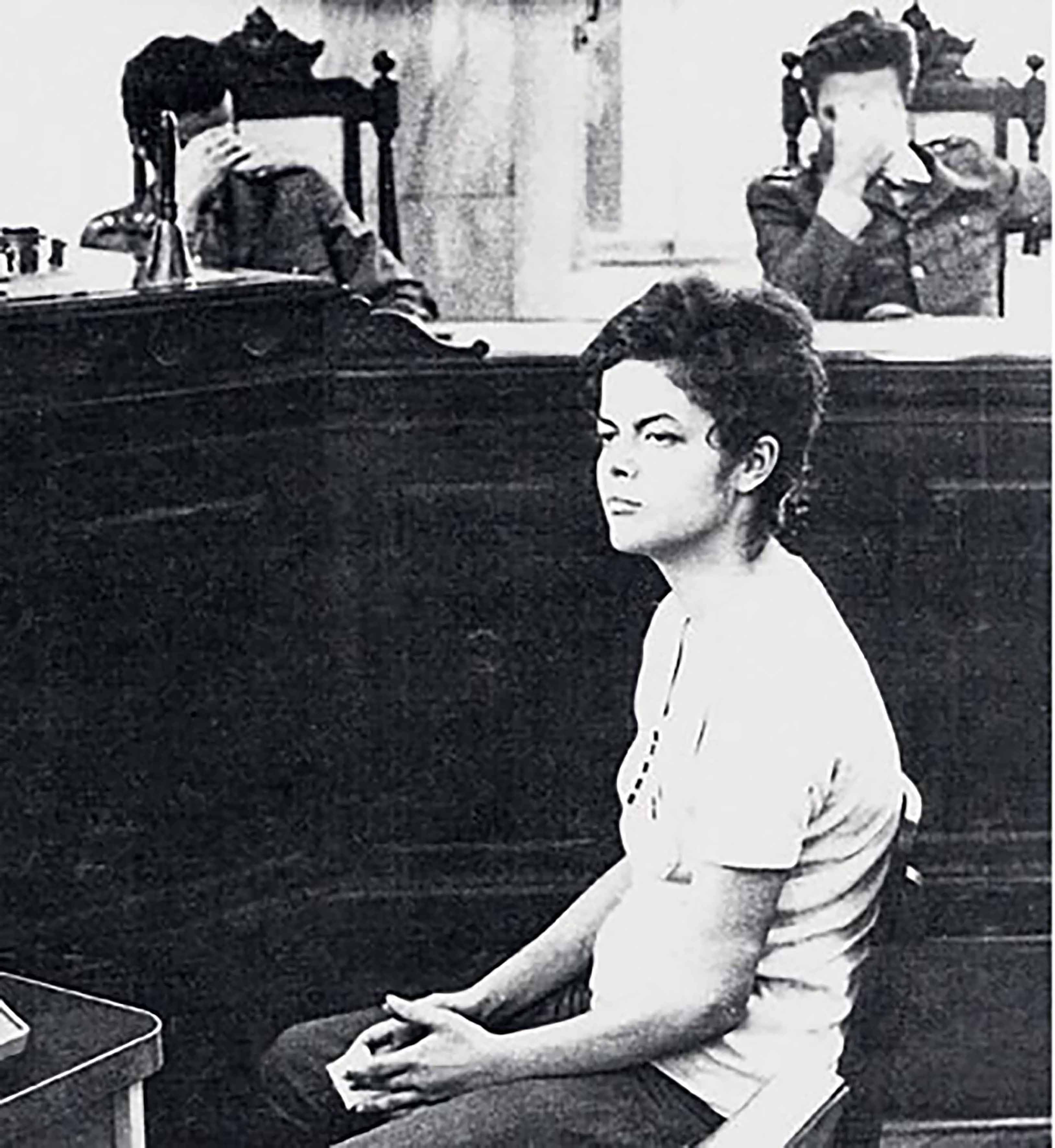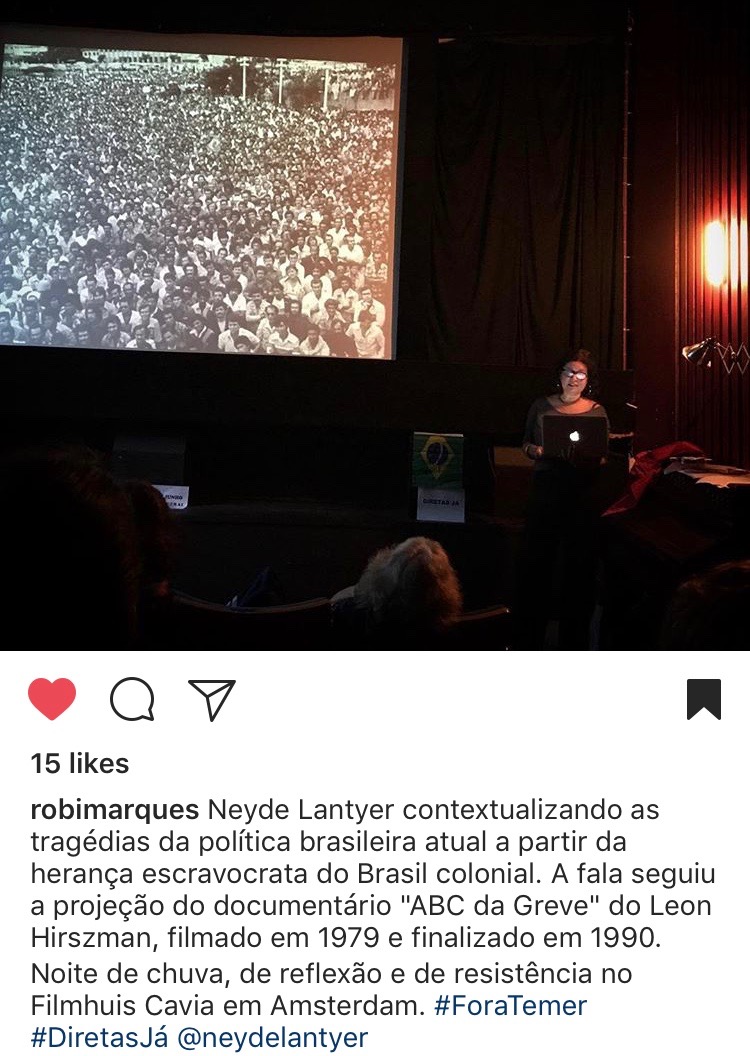Speech after the film screening
“ABC of A Strike” by Leon Hirszman
Collective Amsterdam for Democracy in Brazil
CAVIA FILMUIS
Amsterdam
2017





GOOD EVENING!
To provide a hint into the political situation in Brazil isn’t an easy task and I am not a specialist. I’ll share with you some basic ideas that I hope will help you to understand the current state of affairs in my country.
1. ORIGINS
Brazil has a very short democratic experience. The Brazilian middle-class mentality likes to think of itself as modern but in fact, the Brazilian history is deeply rooted in its colonial past, which encompass 500 years of Portuguese rule (as well as the exploitative presence of the Dutch, French, Spanish, North American, etc). All that plus 300 years of slavery in the most violent fashion of human and economic exploitation.
The Brazilian society was forged in the shadow of slavery, which generated specific social relations, specific family types, a specific justice system and a very particular type of economy that accumulates capital by means of force, condemning the most fragile to abandonment and daily humiliation.
The Brazilian slavery heritage was never left behind; it keeps shaping the Brazilian class relationships, which are extremely unequal and violent.
2. THE COUP-D’ETAT
The coup that removed Dilma Rousseff from power was misogynous, classist and patrimonial.
In 130 years of Republic (from 1889), Brazil has practiced archaic forms of republicanism, suffering political instability and therefore several coups-d’etat such as the proclamation of Republic itself. The 1930’s “Revolution” and, more recently, the military coup of 1964, which lasted 21 obscure years, torturing, killing and making disappearing its opponents. The rise of the metal workers, as seen in the film, was the largest popular resistance movement that Brazil has ever seen and played an important roll in the defeat the military’ dictatorship in the 80’s.
The overthrowing of Dilma Rousseff – the first female president of the country – by means of an illegal impeachment, was in fact a parliamentary/judiciary coup, strongly supported and promoted by the Brazilian hegemonic media and the Supreme Federal Court of Justice, both at the service of the economic elites. It was also carried by a middle-class that has no economic power but holds the “knowledge”, such judges, doctors, journalists and university professors. The economic elites buys media, justice, politicians while keeping the people in a permanent state of ignorance.
The 2016 coup was justified by a moralistic agenda against corruption, which selectively attacked ex-president Lula and the PT (Worker’s Party). In power from 2002 until the coup-d’etat last year, the Worker’s Party have been the main legislative and executive agent of a small but important social change which created a minimum system of social protection and access to education to the poor and black people. In fact, the real intention of the coup of 2016 was eradicating such social benefits created by the Worker’s Party governments, with the purpose of keeping the people in a everlasting state of poverty and exclusion.
3. THE WORKING CLASS
Brazil has a very precarious working class, closely linked to the heritage of slavery, without access to formal education, living in poor areas, targeted by the police that systematically kills the black youth. This unprotected class is mostly black, but also encompasses Northeastern migrants and the indigenous population and can be identified by the lack of access to services and rights. Both exploited and hated, they have inherited the derision once meant for the slaves. Their only function in society is to sell their labor force.
Despite the remarkable economic achievements, the decrease of poverty and the respect of the international community, the 13 years of Worker’s Party in presidency fail to create the necessary changes in the system itself. If, on the one hand, their new social policies to protect the vulnerable transformed the lives of 40 million people, on the other, they were not able to promote the basic reforms – in the political, tributary and communication systems – to revert the patrimonial order and effectively guarantee social justice for long-term changing outcomes.
Even so, part of the Brazilian society felt threatened by the small economic rise of those historically abandoned groups that took place in the last 13 years. This sentiment was expressed in the anger with the presence of poor people in shopping malls and at airports. Such anger increased when the domestic workers achieved their rights for fair wage and holiday pay but, specially, when the poor and black began to attend universities.
The improvement of life of the poor was definitely not desired and therefore, the coup got the massive support of the middle-class, directly affected in their privileged way of life in which they had been free to exploit domestic workers in archaic forms of working relationships. It is important to understand that the systematic vote of the Brazilian middle class against the PT project was a vote against social inclusion.
Ultimately, the coup that lifted to power the current illegitimate president Michel Temer and a gang of all sorts of corrupted politicians is an attempt to maintain the survival of the patrimonial system based in the heritage of slavery, resulting in a society that humbles the poor. The system has spread such an intense hatred that any improvement in misery generates violent reaction, backed by the media. The society is divided and blind to understand that this tragic moment in our history can delay in many decades the Brazilian dream of becoming a modern society.
To provide a hint into the political situation in Brazil isn’t an easy task and I am not a specialist. I’ll share with you some basic ideas that I hope will help you to understand the current state of affairs in my country.
1. ORIGINS
Brazil has a very short democratic experience. The Brazilian middle-class mentality likes to think of itself as modern but in fact, the Brazilian history is deeply rooted in its colonial past, which encompass 500 years of Portuguese rule (as well as the exploitative presence of the Dutch, French, Spanish, North American, etc). All that plus 300 years of slavery in the most violent fashion of human and economic exploitation.
The Brazilian society was forged in the shadow of slavery, which generated specific social relations, specific family types, a specific justice system and a very particular type of economy that accumulates capital by means of force, condemning the most fragile to abandonment and daily humiliation.
The Brazilian slavery heritage was never left behind; it keeps shaping the Brazilian class relationships, which are extremely unequal and violent.
2. THE COUP-D’ETAT
The coup that removed Dilma Rousseff from power was misogynous, classist and patrimonial.
In 130 years of Republic (from 1889), Brazil has practiced archaic forms of republicanism, suffering political instability and therefore several coups-d’etat such as the proclamation of Republic itself. The 1930’s “Revolution” and, more recently, the military coup of 1964, which lasted 21 obscure years, torturing, killing and making disappearing its opponents. The rise of the metal workers, as seen in the film, was the largest popular resistance movement that Brazil has ever seen and played an important roll in the defeat the military’ dictatorship in the 80’s.
The overthrowing of Dilma Rousseff – the first female president of the country – by means of an illegal impeachment, was in fact a parliamentary/judiciary coup, strongly supported and promoted by the Brazilian hegemonic media and the Supreme Federal Court of Justice, both at the service of the economic elites. It was also carried by a middle-class that has no economic power but holds the “knowledge”, such judges, doctors, journalists and university professors. The economic elites buys media, justice, politicians while keeping the people in a permanent state of ignorance.
The 2016 coup was justified by a moralistic agenda against corruption, which selectively attacked ex-president Lula and the PT (Worker’s Party). In power from 2002 until the coup-d’etat last year, the Worker’s Party have been the main legislative and executive agent of a small but important social change which created a minimum system of social protection and access to education to the poor and black people. In fact, the real intention of the coup of 2016 was eradicating such social benefits created by the Worker’s Party governments, with the purpose of keeping the people in a everlasting state of poverty and exclusion.
3. THE WORKING CLASS
Brazil has a very precarious working class, closely linked to the heritage of slavery, without access to formal education, living in poor areas, targeted by the police that systematically kills the black youth. This unprotected class is mostly black, but also encompasses Northeastern migrants and the indigenous population and can be identified by the lack of access to services and rights. Both exploited and hated, they have inherited the derision once meant for the slaves. Their only function in society is to sell their labor force.
Despite the remarkable economic achievements, the decrease of poverty and the respect of the international community, the 13 years of Worker’s Party in presidency fail to create the necessary changes in the system itself. If, on the one hand, their new social policies to protect the vulnerable transformed the lives of 40 million people, on the other, they were not able to promote the basic reforms – in the political, tributary and communication systems – to revert the patrimonial order and effectively guarantee social justice for long-term changing outcomes.
Even so, part of the Brazilian society felt threatened by the small economic rise of those historically abandoned groups that took place in the last 13 years. This sentiment was expressed in the anger with the presence of poor people in shopping malls and at airports. Such anger increased when the domestic workers achieved their rights for fair wage and holiday pay but, specially, when the poor and black began to attend universities.
The improvement of life of the poor was definitely not desired and therefore, the coup got the massive support of the middle-class, directly affected in their privileged way of life in which they had been free to exploit domestic workers in archaic forms of working relationships. It is important to understand that the systematic vote of the Brazilian middle class against the PT project was a vote against social inclusion.
Ultimately, the coup that lifted to power the current illegitimate president Michel Temer and a gang of all sorts of corrupted politicians is an attempt to maintain the survival of the patrimonial system based in the heritage of slavery, resulting in a society that humbles the poor. The system has spread such an intense hatred that any improvement in misery generates violent reaction, backed by the media. The society is divided and blind to understand that this tragic moment in our history can delay in many decades the Brazilian dream of becoming a modern society.
Neyde Lantyer, Amsterdam, June 28 2017. Speech at Cavia Filmhuis; debate after the film “ABC of a Strike / ABC da Greve”, a film by Leon Hirszman about the movement of the metal workers in the industrial area of São Paulo known as “ABC”, under the leadership of Lula; the historic strike helped to defeat the military dictatorship in Brazil.*
Event produced by Coletivo Amsterdam pela Democracia e contra o Golpe no Brasil